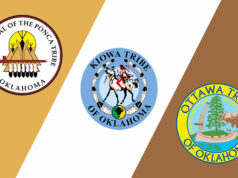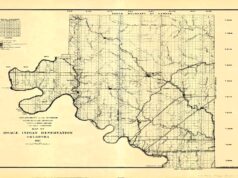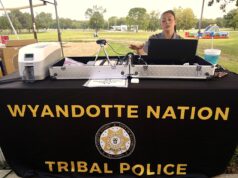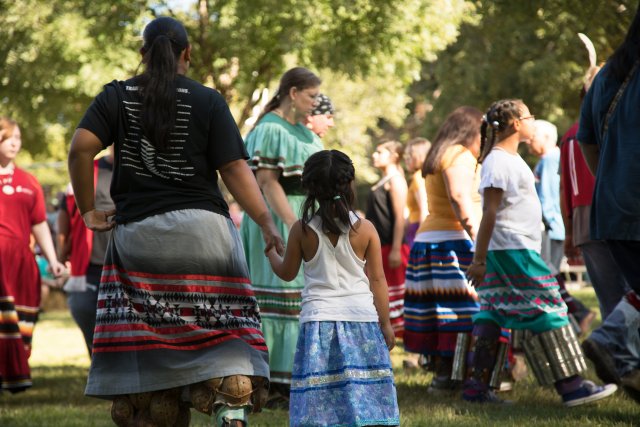

The Muscogee (Creek) have kept their languages alive since around 900-1000 A.D. Greg Anderson, secretary of education, employment and training and acting tribal administrator, said tribal educators teach Mvskoke and Euchi through their own language programs and in partnership with public schools.
“Our language and ways are from where our strength comes,” said Dana Tiger, an artist and registered Muscogee tribal citizen.
This story was reported by Gaylord News, a Washington reporting project of the Gaylord College of Journalism and Mass Communication at the University of Oklahoma. This series entitled “Exiled to Indian Country” details the stories of how each of Oklahoma’s 39 tribes ended up in the state.
The Muscogee Department of Education, Employment and Training conducts cultural responsiveness training with teachers and administrators in the 67 public schools within the boundaries of the tribal nation.
“In a lot of the rural areas, the culture is very rich — the language is spoken more prominently, and we want to make sure those instructors in the classroom understand our students — where they come from (and) their history,” Anderson said. “We want to make sure they recognize that and respect it.”
Tribal language teachers must be certified by being able to speak, read and write the language. The goal of language education in schools is to pass it on for generations, Anderson said.
Tiger, who was born and raised in Muskogee, grew up with grandparents who spoke Creek as their first language.
“The language of our people is what’s most important to me,” Tiger said. “I have a grandson who is 3. It’s imperative that we know it.”
Language education is also offered in nine Head Start programs with an enrollment of about 289 children and their families. Head Start is a social and educational program for 3 to 5-year-old children who may be from low-income households.
The nation takes part in the State Tribal Education Partnership with the state of Oklahoma for Native American education in public schools and has partnered with Weleetka, Wetumka and Dover schools.
Anderson said the partnership is creating the Native Youth Community Project, which is focused on college and career education.
Another initiative, Native Edge, is patterned after the state education department’s Oklahoma Edge, a blueprint for promoting quality public education.
“We’re approaching it from a different perspective — we are working with the schools in providing technical assistance with federal programs, we’re offering teacher fellowships and providing leadership academies for the school administrators,” Anderson said.
Anderson said the tribe works to educate teachers and administrators about the services it offers, in keeping with the Every Student Succeeds Act implemented in 2015.
“It mandates that public schools [that] receive $40,000 or more in Title VI or have a native population of 50 percent or more are mandated to consult with the tribal nations that are in their boundaries,” Anderson said.
For example, Tulsa schools are required to inform the tribe about programs that support Native education.
The tribe’s Department of Education provides $70,000 a year in grants to schools that apply for assistance in areas such as STEM education, which could include robotics programs. The nation also awards college scholarships to its enrolled members.
‘A way to generate revenue for tribal programs’
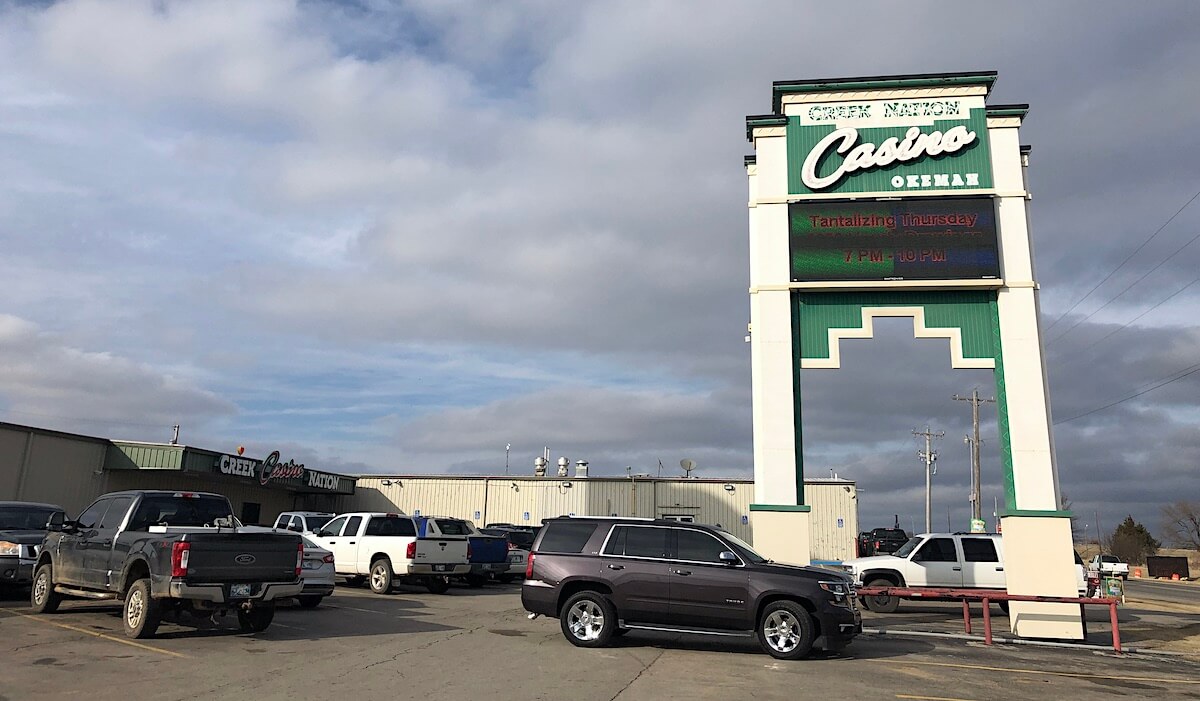
Kyle Dean, associate professor of economics and director of the Center for Native American and Urban Studies at Oklahoma City University, conducted a study of 15 tribal nations and found the tribes generated a $13 billion economic impact on Oklahoma in 2017.
“Our (casino) started with a bingo hall in Tulsa,” Anderson said. “As gaming was brought to Oklahoma, the tribes found it as a way to generate revenue for tribal programs.”
As more casinos began sprouting up across Oklahoma, the tribe found a way to economically diversify with businesses such as gas stations, convenience shops and manufacturing facilities.
‘We’ve come a long way during the relocation’
The tribe has maintained its culture despite being forced by the U.S. government to move to Oklahoma from Georgia in the 1830s on what became known as the Trail of Tears.
Agriculture helped the Muscogee thrive after they arrived in Oklahoma, Anderson said. Eufaula was a resource-rich area where they were able to prosper because it is where the South Canadian, North Canadian and Deep Fork rivers met.
Eufaula also served as “the gathering place of a lot of people who met to form governments and, in a sense, reorganize,” Anderson said.
Today, tribal members remain near the Ocmulgee Mounds, a National Historic Park in Macon, Georgia, that leaders in Oklahoma are building relationships with, Anderson said.
“They have been going back and revisiting a lot of those original homelands and reconnecting with the groups that are down there,” Anderson said.
There are about 87,000 registered Muscogee tribal citizens nationwide. Anderson said many are California residents. The Oklahoma enrollment is about 60,000.
Muscogee is one of the Five Civilized Tribes, which together comprise 750,000 of the 1 million people who are members of the 39 tribes based in Oklahoma.
The Five Civilized Tribes Intertribal Council meets five times a year to work on projects that benefit all tribes.
The Muscogee boundaries stretch across 11 counties from Tulsa to the southeast corner of the state. The Council House in Okmulgee was chosen as the government capitol building because it is the center of the nation. Anderson said the tribal government structure is similar to that of the U.S. government.
Today, Anderson said tribal leaders disagree with Oklahoma Gov. Kevin Stitt over the Muscogee’s gaming compact with the state.
Gaming compacts are an agreement between the tribes and the state about how much money goes to Oklahoma from the revenue generated by casinos.
“The governor wants to renegotiate (and) the tribes do not,” Anderson said. “The governor wants more money and the tribes do not want to give — they like the compact the way it is now.”
The more money the tribes make, the more they are expected to give to the state, according to Anderson.
“We’re a people who are willing to sit down and talk about it … one needs the other,” Anderson said. “Our health services, our education services benefit a lot of people who are non-Native, so we feel we’re doing our part for the state of Oklahoma.”
The Muscogee Nation is among the plaintiffs in a lawsuit against Oklahoma Gov. Kevin Stitt, which was ordered to mediation. U.S. District Judge Timothy DeGiusti extended the date by which mediation must be complete or substantially complete to May 31, due to the coronavirus threat.
Another conflict deals with the court case Sharp v. Murphy over Muscogee jurisdiction, which was first heard in 2018 and known previously as Royal v. Murphy and Carpenter v. Murphy. Tommy Sharp is the current interim warden of the Oklahoma State Penitentiary.
Muscogee tribal member Patrick Murphy was convicted of murder and sentenced to death in an Oklahoma state court. The murder happened inside the boundaries of the tribe’s historic reservation.
Murphy argued he should have been tried in a tribal court since the tribe has jurisdiction on the reservation, but the state of Oklahoma maintains Congress meant to disestablish the reservation that was in place before statehood in 1907.
The Supreme Court deadlocked on the case last year and returned it to the 10th Circuit Court, and the similar McGirt v. Oklahoma case has moved to the forefront. That case argues under the Indian Major Crimes Act that the state does not have the authority to prosecute convicted child rapist Jimcy McGirt, who claims that because the crime occurred on the Creek reservation, he must be tried in federal court.
While the Sharp case seeks a ruling on whether the 1866 territorial boundaries of the Creek Nation constitute an Indian reservation, McGirt focuses on the jurisdiction of the state and federal law over enrolled members who commit crimes within historical tribal boundaries.
McGirt v. Oklahoma was scheduled to be heard April 21 by the U.S. Supreme Court, but has been postponed due to COVID-19 concerns.
Despite challenges and conflicts, Anderson said the Muscogee hope to “bring prosperity to (their) tribal nation.”
Anderson said it is of interest to the tribe to create opportunities in quality education and employment for its citizens. He said they have a goal of economically diversifying in sustainable ways to prepare for the future.
“We’ve come a long way during the relocation — you showed up in Oklahoma (and) you really had to rebuild, you had your culture, you had your people and you had your vision as a tribe of what do you want to be, and you get to Oklahoma and you pretty much have to start over,” Anderson said. “It’s very difficult to do, but I think the tribal nations have done very well and will continue to do well.”










